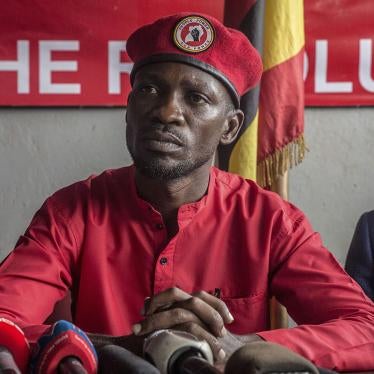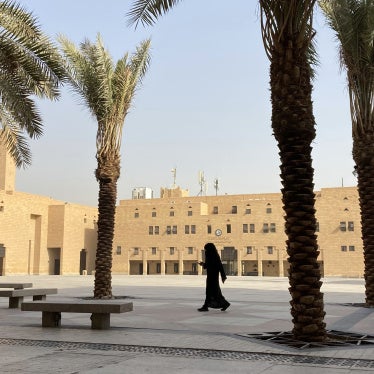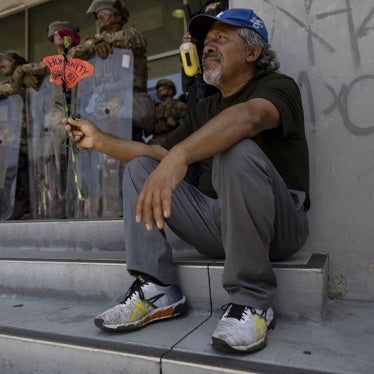Monseigneur Vincent Coulibaly
El Hadj Mamadou Saliou Camara
Dear Monseigneur Coulibaly and El Hadj Camara,
Human Rights Watch welcomes the Guinean government’s efforts to establish a truth-telling and reconciliation mechanism and is honored to have participated in the December 15th workshop in Conakry in support of the provisional commission, which the two of you lead.
Human Rights Watch has long supported a truth-telling and reconciliation mechanism for several key reasons. First, it could help illuminate under-exposed atrocities committed since independence, notably during the reign of Sékou Touré. Second, it could explore some of the dynamics leading to communal and ethnic tensions, which we believe have worsened in recent months and as such make the work of the proposed commission all the more urgent. Third, this mechanism could explore the dynamics that gave rise to and sustained successive authoritarian and abusive regimes. Fourth, it could make recommendations aimed at ensuring better governance and preventing a repetition of past violations.
As you preside over the current consultative phase of the commission’s establishment, we urge you to carefully consider the delicate task of selecting permanent commissioners. Human Rights Watch believes the nomination and confirmation of commissioners must be the result of a comprehensive consultative process with key relevant actors including members of civil society, women’s groups, political parties, labor unions, victims groups, the diaspora, religious leaders, and the security services.
The commissioners must be highly-respected, politically independent, and representative along regional, religious, gender, ethnic, and age lines. To bolster the actual and perceived impartiality, some commissions, like those in El Salvador and Sierra Leone, have included international members. We also support the introduction of appointment procedures, such as public confirmation hearings of the commissioners, to ensure the independence and impartiality of the commission.
As you consider the commission’s mandate, Human Rights Watch wishes to emphasize that while truth commissions can be a meaningful process for reconciliation, they are not a substitute for the pursuit of justice, which many Guineans will suggest is fundamental to recovery from the country’s long history of violence. Prosecutions of those responsible for gross abuses of the past, including the mass killings by the security forces of demonstrators in 2007 and 2009, is crucial to end the cycle of violence and impunity. Many ordinary Guineans continue to grieve over the loss of loved ones and feel strongly that they deserve some means of redress, which only a judicial process can provide. It is critical that at the same time as setting up this commission, time and resources are devoted to ensuring a speedy creation of a functioning independent justice system able to provide criminal accountability for those responsible for current and historic crimes.
Furthermore, as a matter of both treaty and customary international law, Guinea has a duty to prosecute serious international crimes and pursue individual criminal responsibility. As such, anyamnesty provisions of the eventual truth and reconciliation commission must be consistent with Guinea’s obligations under international law. The commission should not be empowered to grant amnesty for violations of international criminal law such as crimes against humanity, extrajudicial killings, enforced disappearances, and torture.
In closing, we include for your consideration an observation from a well-respected human rights defender. This quotation, taken from Human Rights Watch’s recent report on Guinea’s human rights agenda, “We Have Lived in Darkness,” very eloquently supports why Human Rights Watch so firmly believes in the need for a truth and reconciliation mechanism:
Guineans need to critically evaluate the behavior and abuses committed by each and every regime, and explore why history is repeating itself. A truth commission would help arrest the gangrene; it would help us put to one side what divides us, and reflect on what unites us. We must also take a closer look at the issue of ethnicity, which for decades has been used to control, divide, and sow mistrust and hatred among Guineans. We must also look at the role economic crimes and profiteers, who have operated throughout every regime, have played in benefitting from Guinea’s resources at the expense of the population.
We heartily endorse this view and look forward to supporting your efforts to ensuring truth, reconciliation, and justice at this crucial point in Guinea’s history. In the interest of generating public discussion of the issues presented above, this letter will be made publicly available on our website. We look forward to further discussion with you on these crucial issues.
Sincerely,
Daniel Bekele
Executive Director, Africa Division
Corinne Dufka
West Africa Regional Director
Cc:
Professor Alpha Condé, President of the Republic of Guinea
Mr. Christian Sow, Minister of Justice
Philippe Van Damme, EU Head of Delegation
Mr. Jean-Michel Berrit, French Ambassador to Guinea
Patricia Moller, United States Ambassador to Guinea
Dr. Aisha Laraba Abdullahi, Nigerian Ambassador to Guinea
Mr. Said Djinnit, Special Representative, United Nations Office for West Africa (UNOWA)
Mr. Louis-Marie Bouaka, Head of Office, United Nations Office of the High Commissioner for Human Rights (OHCHR) Guinea







